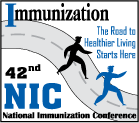
|
|
CDC NIP/NIC Home Page
|
Wednesday, March 19, 2008 - 4:25 PM
96
Immunization Information Systems and Methods to Evaluate and Improve Data Quality
Rebecca S. Coyle, Idaho Immunization Program, Idaho Department of Health and Welfare, 450 W State Street, PO Box 83720, Boise, ID, USA
Learning Objectives for this Presentation:
By the end of the presentation participants will be able to understand ways to assess the data quality of Immunization Information Systems.
Background:
Currently there is no standard method of assessing the quality of data contained within Immunizaiton Inforamtion Systems. Idaho developed a method that utilizes the assessment visits conducted by the AFIX staff and compares that information with the data in the IIS.
Setting:
Public health clinics, public health departments, IIS Staff, AFIX staff, private clinics
Population:
Public and private providers that utilize Immunization Information Systems
Project Description:
Idaho developed a method for examining the provider charts collected during an AFIX visit and then compared the information with the data in the registry to determine an estimated error rate. This method looks specifically at missing immunizations, immunization dates listed in the provider charts, but not listed in the IIS; Hepatitis B birth dose, but no additional vaccines entered; Date differences between the provider charts and the IIS; and incorrect vaccine type. Demographic data was not evaluated during this process.
Idaho was able to establish an estimated error rate that will be presented to private and public providers to help providers target ways to improve immunization rates and data quality.
Utilizing this method Idaho can easily reproduce this method with additional providers to increase awareness of data quality and pin point specific areas for individual providers.
Results/Lessons Learned:
The method Idaho developed has helped both the state and private providers target data entry errors, and export errors that are easily corrected thus improving data quality. Idaho has found that errors were not as common as previously thought and are currently developing materials that target common data errors.